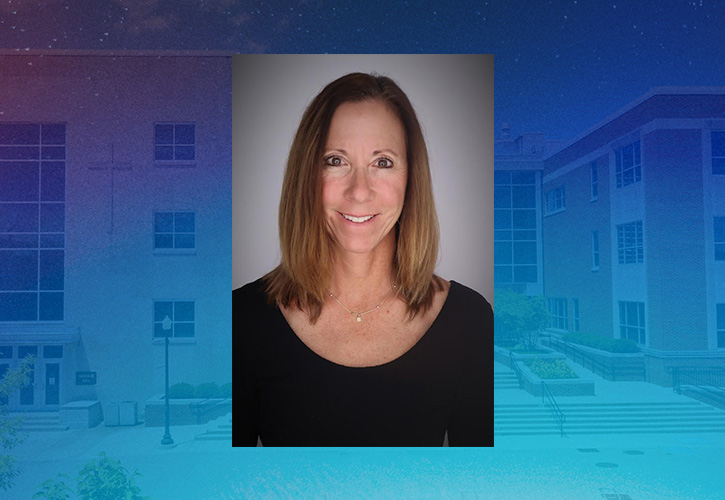College of Arts and Sciences Newsroom

UD professor awarded $633K to prepare K-12 mathematics teachers for digital curriculum
By Dave Larsen
University of Dayton mathematics educator Shannon Driskell was awarded a $633,359 grant from the U.S. Department of Education to create a toolkit for elementary math teachers to ensure that instruction with digital curricula maximizes students’ social, emotional and academic learning.
“When teachers are given a digital curriculum, they need to take time to interact with it and see what the students will be experiencing,” said Driskell, professor of mathematics education. “Unfortunately, teachers are often not given time to do this. They are often told, ‘Here it is. Use it.’”
Driskell received the grant as part of a research consortium with colleagues from Pacific University, Western Oregon University and Texas Woman’s University. The five-year grant started Oct. 1 and runs through July 2028. The University of Dayton’s share of the award is about $100,000 and includes funding for an undergraduate student researcher.
Digital curricula are learning management systems that provide teachers with interactive lessons, multimedia resources, pre-made lesson plans, printable worksheets and student assessment tools that allow for customized learning.
“Many companies are creating these curricula and not really researching how teachers are using them,” Driskell said.
EdSurge currently lists more than 110 digital core curriculum products for elementary mathematics. They include DreamBox Learning, which serves more than 6 million students and 600,000 educators, and i-Ready Personalized Instruction, which is used by more than 10 million students nationwide.
“It’s mind-boggling if you think about all those teachers who are using digital curricula, but they might not have the experience or training to use it effectively,” she said.
Driskell, who taught sixth grade and high school mathematics before receiving her doctorate in mathematics education from the University of Virginia, likened the situation to consuming and understanding a new textbook, as well as its related handout materials and classroom activities, before teaching it to students.
Increasingly, that curriculum and “all the bells and whistles that come with it” are digitized, she said.
To develop a free online toolkit with resources to help teachers enact digital curricula in their classrooms, Driskell and her colleagues will visit K-12 schools in three states, focusing on grades 2 through 6. They will gather data on how teachers are using digital curricula, observe and record video of teachers in the classroom and then record video interviews with the teachers reflecting on their use of the curriculum.
Driskell used the example of a second-grade teacher named Mrs. McConnell using DreamBox to illustrate how the website will work. Users who click on the link for Mrs. McConnell will find video interviews with her discussing her preparation for, and likes and dislikes about working with the curriculum. The website also will feature video with three instances of Mrs. McConnell using the curriculum in her classroom, as well as a follow-up video in which she reflects on what went well, what didn’t and what she might tweak when teaching it next time.
“If I’m a K-12 teacher and I’m just learning how to use DreamBox, I could watch those videos and get some information and helpful tips from Mrs. McConnell, who has used it in her own classroom,” Driskell said.
Despite concerns about proper training for teachers, Driskell said digital curricula can benefit students through its use of artificial intelligence for customized learning. For example, if it recognizes that a student needs help with a particular task or concept, the curriculum can adjust to allow the student to keep working on that topic. Conversely, with another student who understands the concept, the curriculum can continue to move forward with new content.
“There is a lot of data that can help teachers and parents improve their students’ learning,” Driskell said. “That’s a beautiful thing about it; it provides a lot of information on student progress.”
Driskell plans to reach out to several Dayton-area school districts, as well as a number of former students who are now teaching mathematics in Ohio and Kentucky, about participating in her research project.
Her research partners are Steve Rhine, professor of education at Pacific University; Ann Wheeler, associate professor of mathematics education at Texas Woman’s University; and Rachel Harrington, professor of education and leadership at Western Oregon University.
“Dr. Driskell has an extensive research record in the area of mathematics educational technology, including numerous co-authored articles, book chapters and conference proceedings,” said Wiebke Diestelkamp, professor and UD Department of Mathematics chair. “She has served as a journal editor and a reviewer of several journals in mathematics education.
“Technology is tremendously important in today's mathematics classroom,” Diestelkamp said. “Dr. Driskell's work includes evaluating the quality of mathematics education research, guiding K-6 teachers in the proper use of appropriate technology and examining how various approaches using technology can promote students' academic success, emotional wellbeing and social integration.”
For more information, visit the UD Department of Mathematics website.
